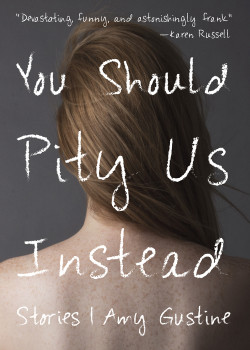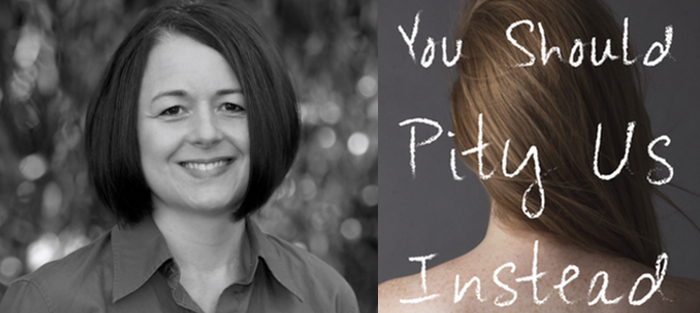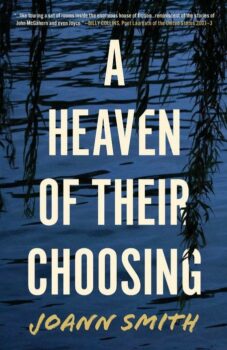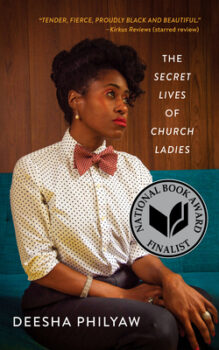I’ve been in a writing group with Amy Gustine for several years, and I’ve long admired the seriousness of purpose and attention to craft she brings to her fiction. (I and other members of the group have long benefitted from the care she brings to her feedback, as well.) So it has been a pleasure to watch her publications slowly accumulate, and a joy now to see her burst onto the literary stage with her debut collection, You Should Pity Us Instead, out this month from Sarabande Books.
Gustine puts her characters in unenviable positions—a father cleaning out his daughter’s apartment after she commits suicide, a mother sneaking into a foreign country in search of a son being held hostage, a woman trying to hide her fifty-six cats from visitors from the Humane Society—and makes it impossible not to empathize and read on to see what they’ll do. In starred reviews, Publisher’s Weekly calls her collection “dazzling”; Kirkus refers to it as “powerful”; and Booklist says her stories “detonate on target, literary grenades of resounding impact.”
In an interview I conducted with her via email in December, Gustine describes her love of the writing process, “finding the spot where the story turns” when deciding how a story should end, and whether the work of women writers is treated differently from that of men.
Interview:
Danielle LaVaque-Manty: I want to ask you about perseverance. The earliest story in your collection was published in 2005; your first book will be published in 2016. What has kept you going during the years in between?
Amy Gustine: There are a lot of answers. One is that there are many reasons things don’t get published besides quality. While it was hard to hear “no” over the years, I also kept in mind that there are many well-loved published authors whose work sparks no interest in me, so I had to simply hope that someday I would find the right people to accept my work at the right time. Another reason—the biggest probably—is that I keep busy. I always have lots of projects in various stages, so I never have all my expectations pinned on one thing. My focus isn’t on what’s not getting published today, but on what I’m writing today, or researching.
Which leads into the next part of the answer—I love the process as much or more than the result. I think that’s true of everyone who excels—they like the nitty-gritty of what they do. Ballerinas don’t spend most of their time actually dancing in front of an audience; they spend most of it exercising and practicing for the performances. They must get pleasure from all that stretching and twirling for its own sake. Writers, as you know, spend their time pushing words around the page. They think. They research. You have to really love sitting quietly in a room coming up with the right word, balancing the sentence structures, inventing the plot points, reading about how carburetors or whatever are made. If you think about the result more than the process, you’ll get distracted and discouraged. Also, I keep in mind that one day I, like everyone, will disappear in a puff of smoke. So what if I spend eighty years writing and only leave behind one really good story? Other than their children, that’s more than most people have the good luck to leave behind. And I have two wonderful kids—so I figure I’m in good shape.
 What has the experience of publishing this collection been like? I’m asking this question in December, and the book is due out in February. What have you learned from the publishing process so far? What are your hopes or fears about the next stage?
What has the experience of publishing this collection been like? I’m asking this question in December, and the book is due out in February. What have you learned from the publishing process so far? What are your hopes or fears about the next stage?
I’ve learned a few practical things, a little bit about press kits and advanced reader copies (ARCs). I learned about the distinction between the trade (pre-publication) review venues like Publishers Weekly, whose reviews are read widely by booksellers and librarians trying to decide what to stock, vs. post-publication review venues that are aimed at readers. After receiving starred reviews from Publishers Weekly, Kirkus, and Booklist—all pre-publication venues—I’ve learned from that that I really like getting stars!
What has struck me most so far is the incredible generosity of other writers. Almost everyone I asked to read my collection with an eye toward providing an endorsement—a blurb, in the parlance—said yes. I understand how busy people are, and certainly I understood when a couple people had to beg off because of time constraints. What surprised me was how few people did. These are busy artists at a stage in their careers far beyond mine; they could expect no personal benefit from helping me, and yet they did. I’m enormously grateful not because they said good things about my work—of course I was very, very proud and pleased at that. What I was grateful for was that they took the time to read my work. That’s where the time commitment came in, and thus they sacrificed doing other valuable things—including their own writing—simply because I asked.
My hopes are everyone’s hopes: win some respectable awards, get good reviews, sell books. My fears stem from my innate shyness. Writing and talking about myself, presenting myself in public, is not something I crave.
Your story “Coyote,” about a mother who becomes obsessed with the danger a neighborhood coyote might pose to her toddler, has a different ending in the version that appears in the book than it did when it appeared in Ascent. Why did you change it, and how did you approach writing the new ending?
The ending is the most different, but in fact I revised the story in several places. That was sparked by a request from Kirby Gann, who was at the time the Managing Editor at Sarabande. Kirby suggested I take a look at the story’s climax because he felt it didn’t fully realize the tensions in the story between the parents: the father’s willingness to accept that you can’t protect your children from all dangers and Cory’s going a bit crazy because she refuses to accept this. It’s very rare that I can do a limited, targeted revision once a change request goes beyond line edits. Once I start thinking about the logic of a story, I usually find the need to go back in and revise it in several places. It reminds me a little bit of what Joan Didion said: “By the time you’ve laid down the first two sentences, your options are all gone.” Everything is so interconnected in a story that I can’t change the climax without going back through and re-thinking several other things. For me, an important element in the story was always Cory’s actions when she confronts the Coyote. I won’t give the ending away, but it’s Cory’s choice at that moment that for me made the story about more than just a woman obsessed with protecting her child from all dangers. What Cory finds she is and is not capable of doing complicates the story in an important way, and so when I was revising I kept that at the forefront of my mind and tried to layer that in—dare I say?—more artfully, but also with an eye pinned to Kirby’s very legitimate point that I hadn’t brought in enough of the story’s other layers, including the tension between Cory and her husband.
Can you tell me more about how you think about writing your endings—and climaxes—in general? I don’t want to give any of the endings away, either, but one thing I admire about your stories is that the conclusions feel satisfying without seeming too tidy or neatly boxed up. One of my favorites is the last page of “Prisoners Do,” which offers a heartbreaking sense of how your two focal characters’ worldviews (I want to say “character” again, really—or maybe core selves) will shape their very different futures. What goals or principles do you have in mind when you write an ending?
I don’t so much have goals or principles—I just feel we’ve come to the end of what the story started. I usually feel my way to that moment by finding the spot where the story turns. In “Prisoners Do” that spot of turning is presaged early in the story when Shayla says she’s fascinated with something about Mike and Fawn but can’t quite put her finger on it. When Shayla goes to Mike’s house she touches that fascination and begins to understand it.
Also every plot raises certain must-answer questions. Sometimes they’re concrete, sometimes not so much. In “Prisoners Do” the question is the same as it is for all people having affairs: will it end or will the married person leave his/her spouse and commit to the lover? For me the natural end to the story had to strongly imply which outcome Shayla and Mike would experience and why. In “Coyote” that plot question is: how far will Cory take her protection of her son? At what point will she accept she can’t protect him? And what will this feel like to her, when she finds the point beyond which she’s willing to go as a mother? In the collection’s title story the plot raises more abstract questions, none of which are answerable but all of which need to be fully revealed in their unanswerability: what is the nature of death? Of God? Where is the limit of our human wisdom on such subjects? And how do we deal with children who want answers when we don’t have any?
I’m not thinking of these questions in the beginning stages of writing a story, but as the story unfolds I begin to see directional signs pop up that make it clearer and clearer to me where to turn and then I see it—the destination. It always rises up out of the dust, closer than I thought it was, and usually as a little bit of a surprise.
 In her recent essay “On Pandering,” Claire Vaye Watkins says she wrote her award-winning story collection, Battleborn, with male readers in mind, and that since having a baby she has tried writing about her intense experiences of marriage and motherhood, but when she does, “it seems quaint or worse.” Your collection includes several stories that focus largely on some aspect of marriage, parenthood, or family dynamics: “Unattended,” “Prisoners Do,” “Coyote,” “AKA Juan,” and “Half-Life.” I find these stories far from quaint; in fact, some of them tend to be fairly dark. “Half-Life,” for example, takes place in a largely domestic setting—a suburban, middle-class home—but features a nanny who grew up in foster care and teaches her charges some menacing survival lessons. How do you think about your audience? Have you ever worried that male readers wouldn’t take an interest in this material?
In her recent essay “On Pandering,” Claire Vaye Watkins says she wrote her award-winning story collection, Battleborn, with male readers in mind, and that since having a baby she has tried writing about her intense experiences of marriage and motherhood, but when she does, “it seems quaint or worse.” Your collection includes several stories that focus largely on some aspect of marriage, parenthood, or family dynamics: “Unattended,” “Prisoners Do,” “Coyote,” “AKA Juan,” and “Half-Life.” I find these stories far from quaint; in fact, some of them tend to be fairly dark. “Half-Life,” for example, takes place in a largely domestic setting—a suburban, middle-class home—but features a nanny who grew up in foster care and teaches her charges some menacing survival lessons. How do you think about your audience? Have you ever worried that male readers wouldn’t take an interest in this material?
No, I never think of my readers as gendered. I don’t accept the notion that much can be assumed about our sensibilities by knowing if we are male or female. That said, culture is always telling us that our sensibilities are primarily gender-determined, so I have no doubt that assumptions about gender play a big role in the writing business—what writers, agents, editors, reviewers, and booksellers assume people will like, and what they look for when they read work to either “workshop” it, edit it, or publish it.
In fact, I don’t think Watkins was saying that she panders to male readers. I think she was saying that she pandered to male writers. She is an ambitious person, as she said, and thus she was looking for approval within the literary establishment, was trying to be taken seriously as a writer, and she felt that you can only be taken seriously, truly seriously, as a female writer if you impress the male powers-that-be with certain styles of writing and certain subjects. Watkins says that she has tried writing about post-partum depression, for example, but that the stories sounded “quaint” to her and failed. That’s an interesting choice of words—“quaint.” I assume she meant it in its primary meaning of having an “old-fashioned charm.” If she’s correct and what she wrote was “quaint,” I suspect that had to do with tone more than subject. But I wonder if she was right. I would like to read one of those stories and see if I find it “quaint” or if her view of her work (and its subject) was prejudiced to start with, because she has been trained by the literary establishment to see the subject matter that way.
You refer to the stories in my collection as focusing largely on aspects of marriage, parenthood, or family dynamics. This is true. But here’s where I think women writers are often treated differently. You could just as easily interpret “AKA Juan” as a story about prejudice and racial identity. You could interpret “Half-Life” as a story about guilt and judgment. You could interpret “Coyote” as a story about the way humans both compete with and coexist with other animals, what our role as dominant predator means and how it’s refracted through our modern sanitized, and much safer, existence. Literature (as opposed to genre fiction) works on several levels. But when a man writes a story about a family (e.g. The Corrections, Revolutionary Road) the universal, cultural themes are held up and highlighted. Often when women do it, even when it’s absolutely, indisputably literature, the “personal and domestic” elements are assigned the primary, or sole, focus. The work is often interpreted through the—possibly subconscious—assumption that women are writing about the personal and men are writing about the universal.
I do want to mention that men pander too. I read a piece in the L.A. Review of Books by Billy Mernit called “My Life as a Woman,” which is about his stint writing romance novels under a female pseudonym. He was challenged by a male friend concerned that Mernit would lose his highbrow taste. “[A] fellow writer…enamored of Pynchon and DeLillo, …accused me of prostitution. Figuratively beating me about the head with Paul Auster’s New York trilogy, he wanted to know what would become of my taste for fabulism and meta-fiction. Where were my literary conceits, the story-within-a-story constructs, the deliberate fictional and fact confusions that I’d praised in Auster’s work?”
I wondered if this friend would have given Mernit a hard time if he’d paid the bills (his motive for the romance writing) by penning formulaic mysteries or crime fiction? I also wondered if Mernit and his friend could honestly separate what they liked from what they had been taught was worthy literary fiction. I couldn’t help but notice this idea that one could “lose their taste” for fabulism or meta-fiction. If it’s authentic, you wouldn’t worry about “losing it.” You wouldn’t be able to escape it if you tried. That’s what I write from—the situations, people, and, yes, the “big ideas” that I can’t escape.
They take hold of me, naturally, without me deliberately choosing them from some smorgasbord of the worthy and the not worthy. I think that’s what every writer should do, because if we don’t, we get caught in this time-bound, narrow idea of what’s worthy and the landscape of literature becomes a flat plain of mimicry. That said, sometimes trying to figure out what you authentically want to write and what you think others respect is like trying to separate the flour from the cake after it’s baked.
You didn’t have an agent when you sold this collection to Sarabande, but you do now, and that agent is handling your novel, Birds for Ransom. Could you tell me a bit about that novel?
It’s about two surgeons, an American and “first generation” doctor who’s made mistakes and is at risk of losing his job, and his best friend, a highly skilled Pakistani who is bending rules to keep himself in the U.S. Both men are keeping secrets from each other and from their families. Throughout the novel guarding those secrets grows increasingly difficult and increasingly vital. I became interested in these characters the same way I often get interested in subjects—by wondering about guilt and moral dilemmas.
What do you plan to write next?
Early drafts of Birds for Ransom had four main characters and about halfway through the process I realized, with the help of trusted friends, that it had gotten too bulky, too diffuse. Two of the four storylines had to come out, though the characters remain peripherally in the novel. I plan to return to these two storylines though because I think they stand alone as a novel in their own right. I’m also in the research phase of a brand new long-form project. I can only say at this point that it’s about sex—in all its many meanings and forms. How’s that for getting men interested?






